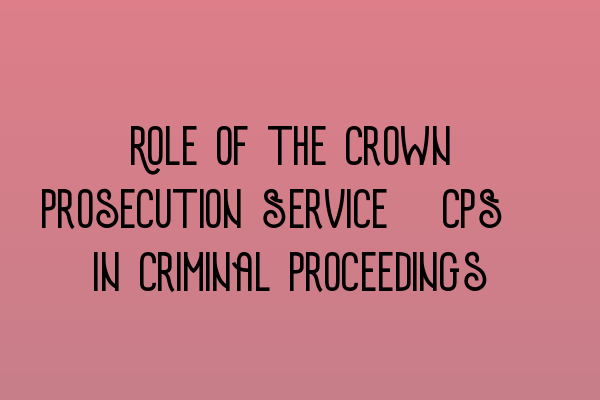The Role of the Crown Prosecution Service (CPS) in Criminal Proceedings
Welcome to the blog of SQE Criminal Law & Practice Law UK, your trusted source of information and expert advice on criminal law. In this post, we will discuss the crucial role played by the Crown Prosecution Service (CPS) in criminal proceedings. As a leading provider of SQE 1 and SQE 2 preparation courses, practice exams, and mock quizzes, we are committed to helping aspiring solicitors understand the intricacies of the legal profession and excel in their careers.
Overview of the Crown Prosecution Service (CPS)
The Crown Prosecution Service (CPS) is responsible for prosecuting criminal cases in England and Wales. Its primary role is to work with the police and other law enforcement agencies to review and prepare cases for court. The CPS ensures that the interests of the public are represented and that justice is served.
The CPS is an independent organization, separate from the police and the government. This independence ensures that decisions to prosecute are made impartially, based on the evidence provided. The CPS operates under the Code for Crown Prosecutors, which sets out the principles for determining whether there is sufficient evidence to prosecute and whether it is in the public interest to do so.
Prosecutors within the CPS are qualified lawyers who assess and analyze evidence, advise the police during investigations, make charging decisions, and present cases in court. They work closely with the police and other relevant agencies to gather evidence, conduct interviews, and ensure that the case is prepared thoroughly for trial.
Key Functions of the Crown Prosecution Service (CPS)
The CPS has several key functions in criminal proceedings:
- Reviewing Evidence: Prosecutors carefully review the evidence gathered by the police to assess its strength and reliability. They evaluate whether the evidence is sufficient to provide a realistic prospect of conviction.
- Charging Decisions: Based on the evidence, prosecutors determine whether there is enough evidence to charge a suspect with a criminal offense. They consider the Code for Crown Prosecutors and the public interest in making these decisions.
- Case Preparation: Prosecutors work diligently to prepare the case for trial. They gather additional evidence if necessary, interview witnesses, and ensure that all legal procedures are followed.
- Advocacy: Prosecutors present the case in court and advocate for the prosecution. They present evidence, examine witnesses, and make legal arguments to support their case.
- Victim Support: The CPS is committed to supporting victims and witnesses throughout the criminal proceedings. They provide information, guidance, and assistance to ensure the well-being and effective participation of those involved.
Importance of the Crown Prosecution Service (CPS) in Criminal Proceedings
The role of the CPS in criminal proceedings is vital for the functioning of the justice system. The CPS ensures that cases are prosecuted fairly, based on the available evidence and in accordance with the law. It safeguards the rights of both the accused and the public, ensuring that justice is served and that the guilty are held accountable.
To learn more about the legal profession and prepare for your SQE 1 and SQE 2 exams, check out our SQE 1 Practice Exam Questions and SQE 1 Practice Mocks FLK1 FLK2. Our comprehensive SQE 2 Preparation Courses and SQE 1 Preparation Courses will provide you with the knowledge and skills required to succeed in your legal career.
Stay updated with the latest SRA SQE exam dates by visiting our SRA SQE Exam Dates page.
Thank you for reading our blog post. Stay tuned for more informative articles on criminal law and practice.
